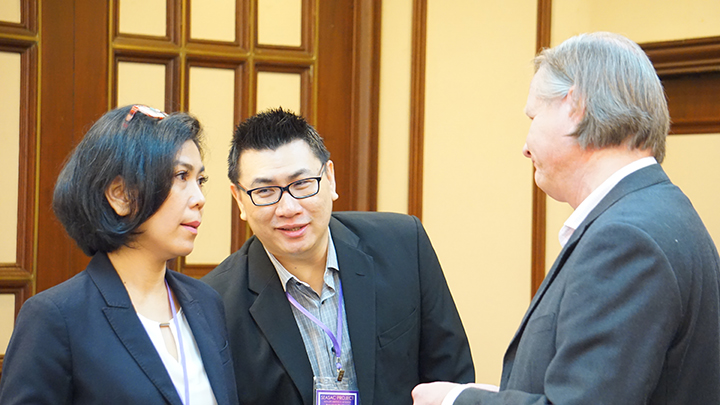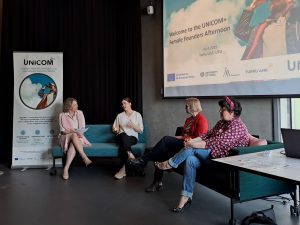Yhä useampi nuori Suomessa kokee yksinäisyyttä, ulkopuolisuutta ja eristäytyneisyyttä. Tähän ongelmaan pyritään puuttumaan NOPPA-hankkeella, jossa osallisuutta lisätään pelillistämisen avulla. …
Tekijät | Authors

Impression in Sales Meetings: Three Approaches
International business can’t be considered only as “international” but as a mixture of numerous styles, habits and features typical for countries and regions. To gain confidence and make a positive threshold effect in your business meetings, you should know how to prepare yourself.
In this article, we get to hear three approaches to this burning theme from different cultural environments. All these approaches – and many more – have been present in the project South-East Asian Sales Competition, SEASAC.
Central aims of SEASAC include accelerating the offering of B2B sales studies in South-East Asia and promoting intercultural learning in sales. Hands-on cooperation between Asian and European counterparts yields direct benefit for both continents: SEASAC and European Sales Competition offer reciprocal opportunities for students to compete and lecturers to assess sales performances as judges and buyers, thereby expanding students’ and lecturers’ cultural understanding of B2B sales.
Overall, international sales competitions are great platforms to showcase different versions of impression management.
Impression management in practice
What aspects in impression – e.g. in appearance, behaviour, outlook – of the salesperson are important? Let’s get remarks from three countries, first from Indonesia.
Outlook matters in Indonesia
The ability to give a professional and convincing impression is a very important skill for a salesperson in Indonesia when meeting potential customers, and especially the first impression will be very helpful in the next stage of business meetings.
Not surprisingly, in recruiting special employees in the sales department who will have many direct interactions with potential customers, companies in Indonesia also tend to choose candidates who have an attractive physical appearance, such as a beautiful/handsome face, ideal height and weight, well-dressed, and a systematic way of speaking. They know how to respond to information in a manner that is polite, proportionate and have a body language that is still able to show respect for the other person.
This shows that companies in Indonesia view that physical appearance can be initial capital to give a convincing impression and attract the attention of potential customers; this is also supported by several studies.
One thing that is also unique about Indonesia is that its society is very diverse, as it consists of various cultures and ethnic groups. These ethnic groups also have their own characteristics and uniqueness which are reflected in the manner, habits or communication styles of each individual. In fact, this has an influence in building impressions and interactions in the business world in Indonesia.
The greeting plays big role in Thailand
Another perspective comes from Thailand.
Particularly, Thailand is a country with a rich culture throughout the greeting, dressing, seniority, as well as body language. Those aspects show how Thais can impress others.
People greet each other by using a sort of body language; named as “wai”. Wai (pronounced like the word “why”) is the traditional greeting of Thailand. It is usually paired with the word “hello” in Thai, which is Sa-wat-dee, thereby making it a unique way to say hello; however, it is also a way to show respect. Offer a “wai” only to a person of equal or greater status. Subordinates should offer a wai first.
A Thai businessperson may shake hands with foreigners. The body language is also a big deal in Thailand. A smile is often used for many different emotions. It may represent an apology, a thank you, a greeting, or show embarrassment.
Additionally, in Thailand, dressing properly is recommended. For businessmen, pants and shirts – white or coloured – with or without a tie. A light suit or jacket adds status and senior executives wear lightweight suits to work. In the evening, dark business suits or formal traditional Thai shirts are worn.
Context rules in casual Finland
From hot and humid South-East Asia, we move to cold northern Europe and specifically Finland.
It is vitally important to “map” the target customer – the goal being to know the customer’s basic facts, personnel, operations, mission, vision and strategy, competition landscape etc. very well even before the first contacts. While you have built your own confidence in selling by doing your homework properly, it is the first impression that counts very much indeed.
Within the Northern European business environment, the seller should try to be “one of them”, be able to speak the customers’ language and hopefully look a lot like them, meaning appearance and behaviour. A few examples:
When meeting university representatives or scientists alike, try to dress as they do, usually quite casual. Even t-shirt, jeans and maybe a pullover are a perfect match. The higher within the organization the discussions go, you may initially consider a more formal dressing. When meeting with banks, insurance companies, law firms and alike, at the first meeting wear a dark suit and a tie. Female representatives wear a matching smart dress.
As you get more familiar with the staff, you may leave the tie or even the suit out, but always follow and match the customer’s behaviour. And, when operating with public organizations and private entities in general, you should begin with at least a smart casual dress, giving a clear impression of respecting their work. You are always welcome as the customer realizes that you can provide help!
Learning impression management
In the SEASAC concept, all partner universities are initiating B2B sales courses by utilizing some joint contentual and pedagogical ingredients, but still in their own unique way and coordinated with other studies.
The aspect How to improve the impact of impression and how do you teach this for your students? will be elaborated by three sales lecturers from Thailand, Indonesia and Finland.
Lifelong training applied in Thailand
Thai students have been taught solemnly related to respect, seniority and impression at every level from kindergarten to higher education. Thai students are required to wear uniforms even at the higher education level. The greeting by giving a “wai” to professors every time before classes is also essential.
Mahasarakham University in Thailand provides a Personality for Socialization class, in which students learn the concepts and importance of personality; factors influencing personality; personality improvement for enhancing a positive image; other skills for self-development and career success including general social etiquette associated with business meetings, events and banquets; personality for effective interpersonal relations.
Multidimensional business rep training in Indonesia
Regarding positive impression, Business Management students in Polibatam Indonesia are trained through several learning modules increasing their knowledge and skills, including business ethics, business communication, marketing and sales techniques. In additional, Polibatam also invites industry partners to teach the students about business manners, including the practice of table manner, dress manner and even beauty classes.
To emphasize the importance of appearance in the everyday life, students on certain courses are also required to wear neat and formal clothes to practice clothing habits that are appropriate in business environments.
Practice makes perfect in Finland
Doing homework properly increases your own confidence, thus leading to a better first impression. The core principles of impression management, including e.g. emotional intelligence, are discussed in several sales and sales management courses.
The approach of the Finnish Turku UAS could be summarized as “practice makes perfect”. We use lots of so-called tri-pod exercises in which one student acts as a sales rep, another as a buyer while the third one is learning via observing. Rotation of roles, added with feedback also from the lecturer, gives a holistic perspective of the fundamentals and nuances of sales meetings.
These exercises have the best value in multicultural settings and luckily, we have lots of exchange students every year in our International Sales Semester. The learned skills are then tested and evaluated as part of internal, national and international sales competitions in which Turku UAS’ students participate regularly.
Authors:
Bambang Hendrawan, State Polytechnic Batam, Indonesia
Watjana Poopanee, Mahasarakham University, Thailand
Jouko Broman, Turku University of Applied Sciences, Finland
Harri Lappalainen, Turku University of Applied Sciences, Finland (firstname.lastname at turkuamk.fi)
The South-East Asian Sales Competition project is co-financed by the European Commission’s Erasmus+ Capacity Building in the Field of Higher Education programme. This communication reflects the views only of the author, and the Commission cannot be held responsible for any use which may be made of the information contained therein.
Photo: Photo library of the SEASAC project








